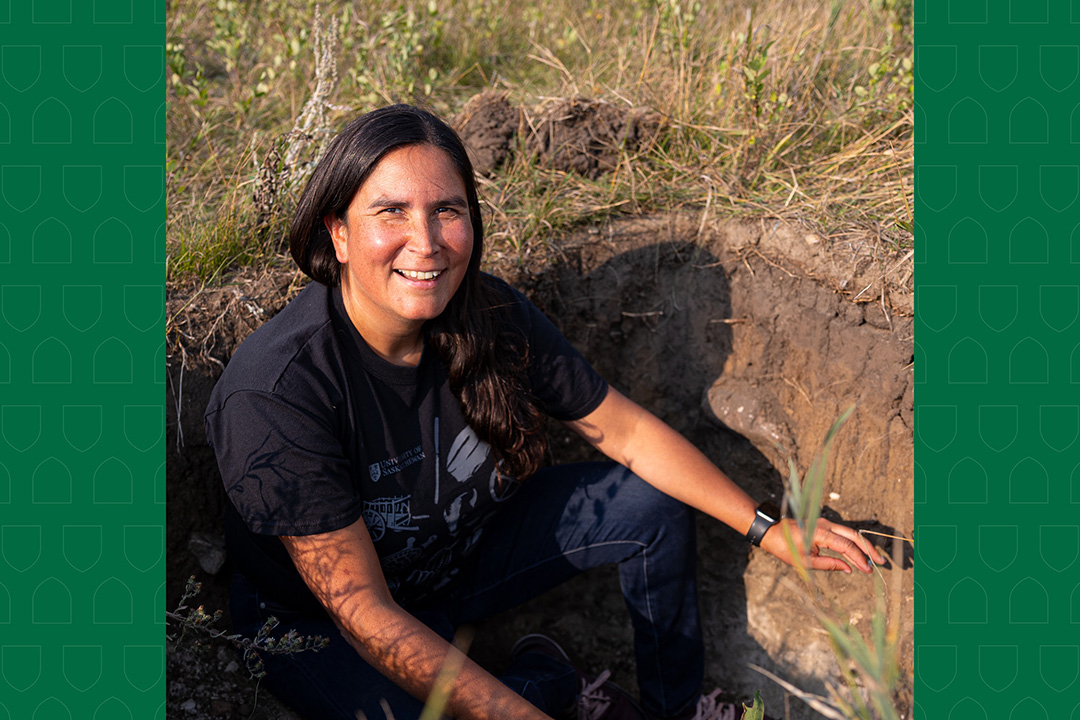
Indigenous Achievement Week Spotlight: Q & A with Dr. Melissa Arcand
For University of Saskatchewan (USask) soil scientist Dr. Melissa Arcand (PhD), her research is as much about people and communities as it is numbers and data.
By College of Agriculture and Bioresources CommunicationsArcand is a member of the Muskeg Lake Cree Nation and an associate professor in the Department of Soil Science in the College of Agriculture and Bioresources.
Through her research, Arcand is connecting Indigenous knowledge systems with Western science, which has led her to working with First Nations to protect the land.
Arcand serves as academic director for the kihci-okâwîmâw askiy (Great Mother Earth) Knowledge Centre at USask and is an academic advisor for students in the Kanawayihetaytan Askiy program, designed to train students to work in resource management and land governance in Indigenous communities across Canada.
For Indigenous Achievement Week at USask, Arcand took time to discuss her research and experiences, and share advice for Indigenous students.
USask: What does your research focus on?
Arcand: My research focuses on soil nutrient cycling, nutrient use efficiency, carbon sequestration, and soil health in agricultural systems. Lately, I’ve had the great opportunity to partner with First Nations on questions related to soil health in the agricultural lands.
USask: How did you develop an interest in this topic?
Arcand: I grew up on a farm on the Muskeg Lake Cree Nation. My dad farmed for 37 years, and my mom and grandparents tended large gardens, so I was connected to the soil through my family’s livelihood. I didn’t get interested in soil science, though, until I had the chance to work as a summer student in a soil science lab during my undergraduate degree. It was then that I connected how diverse soils are across different regions, landscapes, and how they respond to human activity and management. I love soil science because it is the study of the land and has application to people and the way we interact with and steward the land, while also integrating most of the core sciences like biology, chemistry, and physics.
USask: What project are you currently working on?
Arcand: I have multiple research projects on the go. One of the projects I am most excited about is led by two First Nations in Saskatchewan. We are implementing beneficial management practices on croplands, pasture rejuvenation, and marginal cropland restoration and then monitoring the changes to carbon sequestration, greenhouse gas emissions, and biodiversity. We are trying to understand if implementing certain practices can have beneficial impacts on climate change mitigation and biodiversity loss.
USask: What impact do you hope to make with your work?
Arcand: The research will help to inform which practices can help to maintain productivity while improving environmental management. Can farming be more efficient with the resources required to grow health crops, while maintaining the health of the land?
USask: What inspires you in your work and research?
Arcand: I am inspired by working collaboratively with people from diverse perspectives and backgrounds. It helps to think about my own research in a new light. I am also inspired to do work that can help individuals and communities make informed decisions when it comes to agricultural practices and land management.
USask: What advice would you give to Indigenous students pursuing a career in science or agriculture?
Arcand: Take advantage of the learning and professional opportunities outside of classwork. I would never have become a soil scientist and professor if it wasn’t for that summer student job I took after my first year of undergrad.
Also, know that you belong here, and you can find community in science, and even in agriculture—Indigenous Peoples had thriving food systems before colonization and many communities are bringing those food systems back. We are also connected to agriculture through Treaty.
Together, we will work towards Truth and Reconciliation. We invite you to join by supporting Indigenous achievement at USask.

